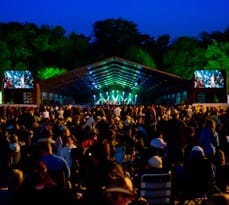Cambridge Folk Festival contributes almost £1.7 million directly to the local economy every year according to research by Management Studies undergraduate students at Cambridge Judge Business School.

The findings reveal that the direct expenditure value of the Festival is approximately £1,667,000, with a total off-site spend of £1,484,000 and on-site spend of £183,000. The average amount spent by festival-goers was found to be £378.04 per person, with £94.51 spent in the city compared to a typical tourist’s £47.80.
The research into the impact of the Festival on the local economy and local businesses was undertaken for Cambridge City Council as an educational consulting project by three undergraduate students: Rian Matanky-Becker, Megan McLaren and Grace Mitchell.
Cllr Richard Johnson, the executive councillor for arts and recreation, said:
This is a tremendous figure and reinforces the positive impact that the folk festival has for Cambridge, not just economically but also in terms of its standing as a world-class event that showcases the city.
Research was conducted through telephone interviews with local business owners and two online surveys, which generated responses from 880 attendees and 123 local businesses.
Over half of the businesses that responded considered the festival to have a positive impact on their business; a finding of 53 per cent that compared favourably against other festivals including Glastonbury with 37 per cent and V Festival with 26 per cent positive responses.
Accommodation, restaurants and grocery stores were the primary beneficiaries, with hotels reporting an 88 per cent positive impact on business and grocery stores 53 per cent. No business reported a strongly negative impact. In comparison with other festivals, Cambridge Folk Festival disrupts a lower proportion of businesses and attendees bring above-average economic benefits.
The areas that benefit most from the festival are Cherry Hinton, closest to the grounds, the city centre, Grafton, and Cambridge market. Businesses further away reported less of an impact but the difference was not substantial; the most significant impact was closest to the site but a second peak impact occurs for businesses two miles away as visitors purchase goods like food, camping equipment and clothes in the city.
Following the research findings, the students also suggested ways to increase the economic impact of the festival, including further prioritising local businesses when allocating on-site stalls and offering visitors vouchers for businesses in the local area. Recommendations for better communications with local stakeholders included greater interaction with local media, a stronger social media presence, and information and FAQ guides for local businesses on the festival website.
Megan McLaren talks about how the MST programme helped the team prepare for their consulting project and her stand out moment from the experience:
“The quantitative methods course was particularly useful for this project with all three of us being former arts students; the quantitative nature of our analysis was as a result not tarnished by this at all and we came up with some great results for the Council.”
“The standout memory we will take from the project is getting to know the city in depth from so many interviews with local business owners across the City Centre and Cherry Hinton – this made a great end to our four years in Cambridge.”
The students were studying the Management Studies Tripos which is open to all third and fourth year Cambridge undergraduates and provides an opportunity to develop an intellectually rigorous and thorough understanding of the discipline, activity and practice of management. The programme consists of six core courses and electives, a workshop and a real-life consulting project with an external organisation.

